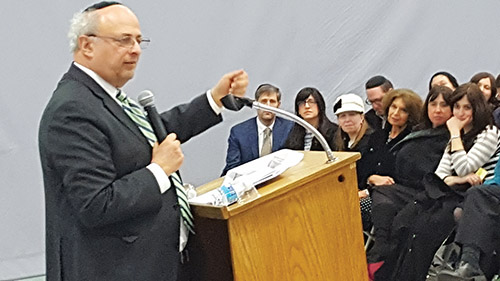

This year, RYNJ’s new “We’re All IN Together” school-wide middot initiative has focused on inculcating a sense of “we” as opposed to “me” in the students. Furthering this drive, over 200 RYNJ parents gathered at RYNJ on Motzei Shabbat, February 4, to hear a presentation from noted psychologist Dr. David Pelcovitz. Dr. Pelcovitz holds the Gwendolyn and Joseph Straus Chair in Psychology and Jewish Education at the Azrieli Graduate School of Jewish Education and Administration of Yeshiva University, and is also an instructor in pastoral counseling at RIETS. The topic was how to become a more socially and academically inclusive community. The evening began with a psychological “experiment” designed by Dr. Frohlich, the director of psychological services at RYNJ, as arriving parents were assigned random seats instead of being able to sit with their friends. Using their phones or provided Chromebooks, they were then asked to rate their degree of comfortability with this seating arrangement at the beginning and end of the program, demonstrating our ability to habituate to uncomfortable situations over time. This connected to Dr. Pelcovitz’s overall challenge to the community, which was for us to commit and get used to moving out of our social comfort zones and to trust that even if there will be a short-term uncomfortable feeling, we will adjust, become more comfortable over time and even feel enriched by the experience.
Dr. Frohlich also presented the audience with four scenarios of common but tricky parenting dilemmas, and the audience was asked to vote again for the choices they would make in each situation. The resulting discrepancies, displayed overhead, reinforced the notion that parenting is replete with challenges and it is important to seek guidance and perspective.
Dr. Pelcovitz began his talk by discussing research about the effects of social exclusion. He shared stories of individuals who were socially excluded as children and how they emotionally processed and handled that experience through the years. He also cited Rabbeinu Yona’s dictum that it is exceedingly difficult to do teshuva for ona’at devarim, hurting other people with words, because we often don’t even realize we have done it.
One of the important take-away messages for parents was to be very vigilant about our children’s relationship with social media. It is so easy for children to publicly and permanently record their thoughts, feelings and opinions on group texts, emails and postings. Consequently, today’s children are at a much higher risk for excluding, insulting and causing long-lasting harm to other children than in previous generations. Even innocent behaviors, such as publicly posting pictures of your small Super Bowl party with a few of your classmates, may cause other children to feel excluded and rejected.
Dr. Pelcovitz cited the concept of “ethical fading” as a related causal factor. “Ethical fading” means that although intellectually we can usually identify the ethically correct behavioral choice, we often don’t behave accordingly when our self-interest (level of comfort, perception of negative impact on the happiness of our own children, etc.) runs contrary to those ethics.
To ameliorate “ethical fading,” Dr. Pelcovitz recommended “bringing voice to values”—for parents to make a strong effort to frequently discuss ethical scenarios with their children. By consistently talking these through, in combination with seeing their parents actually model social inclusion even in situations where it is not comfortable, children will learn to internalize what they were taught and to behave according to their ethics, not just how comfortable they feel in the present.
The most powerful lessons of our lives are often invisible. When children grow up seeing their parents going out of their way to include others, they experience an irreplaceable ikar of chinuch. Let us ensure that our children’s reflex is to be mindful of others, both in thought and in action. And let us remind them with Aharon HaKohen in mind, that in order to be an ohev shalom, we have to be a rodef shalom first.













